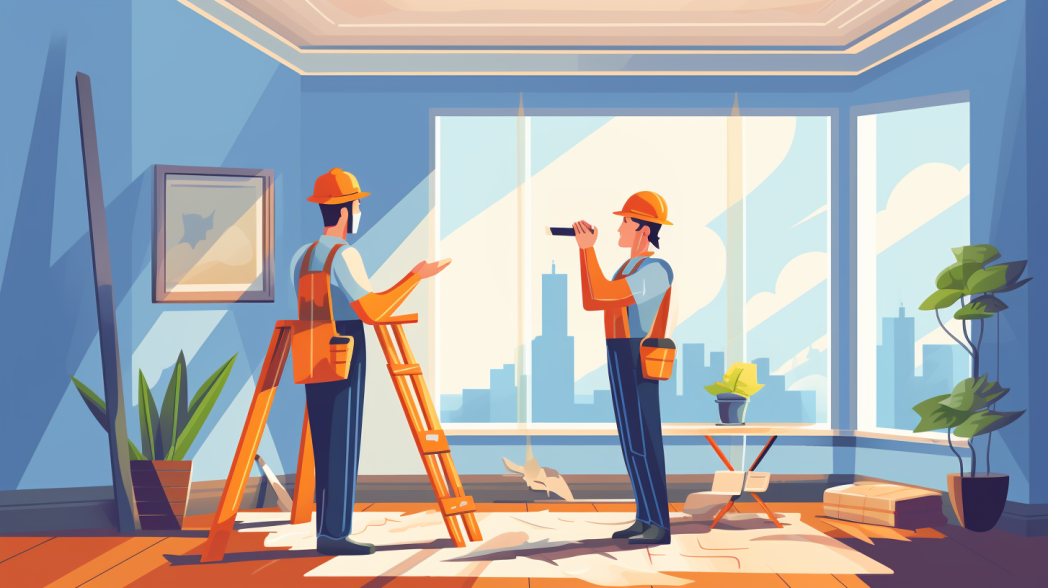Home Renovation Budget Breakdown – Your Guide to Success

Welcome to my guide to home renovation budget breakdown! As a professional copywriting journalist, I know firsthand how important it is to plan and budget for a home renovation project. With a well-planned budget, you can avoid overspending, unexpected costs, and ultimately achieve your desired outcome.
Thankfully, there are handy tools available to assist you, such as the Renovation Cost Calculator, which can help you estimate costs for materials, labor, and other expenses. This guide will cover the key aspects of budgeting for a home renovation project, including cost breakdowns, affordable planning strategies, and common mistakes to avoid.
Whether you’re planning a small bathroom remodel or a complete home renovation, this guide has you covered. So, let’s get started and ensure your next renovation is a success!
Key Takeaways:
- Budgeting for home renovation projects is crucial for avoiding overspending and unexpected costs
- The Renovation Cost Calculator is a useful tool for estimating expenses
- This guide will cover cost breakdowns, affordable planning strategies, and common budgeting mistakes to avoid
Understanding Your Home Improvement Costs
When taking on a home renovation project, it’s important to understand the various costs associated with it. Budgeting for home renovation is crucial in order to avoid overspending and ensure a successful outcome.
Materials: One of the biggest expenses in home renovation projects is usually materials. This can include everything from lumber and paint to appliances and fixtures. It’s important to research pricing and quality beforehand and to allocate enough funds for the materials needed.
Labor: Another significant cost is labor. Depending on the complexity of the project, there may be a need for multiple contractors, such as plumbers, electricians, and carpenters. It’s important to obtain multiple quotes from contractors and factor in their fees when budgeting for the project.
Permits: In some cases, a renovation project may require permits from the city or county. These permits can come with a price tag and should be factored into the overall budget.
Design fees: If you’re working with an interior designer or architect, their fees should also be considered in your renovation budget.
By understanding the various costs associated with home renovation, you can create a realistic budget and ensure that the project stays on track.

Breaking Down the Cost of Home Remodeling
When budgeting for a home renovation project, it’s important to have a clear understanding of the different expenses that you’ll be facing. To create a realistic budget, you’ll need to estimate costs not only for materials and labor but also for any necessary permits, design fees, and unexpected expenses that may arise. Here, we’ll take a closer look at the cost breakdown of home remodeling, so you can have a better idea of what to expect.
First, let’s consider some average costs for common renovation projects:
| Project | Average Cost |
|---|---|
| Kitchen Remodel | $25,000 – $50,000 |
| Bathroom Renovation | $10,000 – $20,000 |
| Basement Finishing | $20,000 – $40,000 |
Of course, these are just rough estimates, and the actual cost of your project will depend on a variety of factors, including the size of your space, the materials you choose, and the complexity of the work that needs to be done.
When estimating home renovation expenses, it’s important to break down the costs into individual components. This will help you see where your money is going and identify any areas where you might be able to save. Here are some of the major expenses you’ll need to consider:
- Materials: The cost of materials can vary widely depending on what you choose. For example, high-end countertops or appliances will cost more than standard models. Do your research to find good-quality materials that fit your budget.
- Labor: Labor costs will depend on the nature of the work you’re having done and the contractor you choose. Shop around to get multiple quotes and make sure you choose someone with a good reputation.
- Permits: Depending on the nature of your project, you may need to obtain permits from your local government. These can add to the overall cost of your renovation.
- Design Fees: If you’re working with an architect or interior designer, you’ll need to budget for their fees as well. Discuss the scope of the project and your budget early on to ensure you’re on the same page.
- Contingency Fund: It’s always a good idea to set aside some extra money for unexpected expenses that may arise over the course of the project. Many experts recommend allocating at least 10% of your total budget for contingencies.

When creating your renovation budget, be sure to consider all of these factors and adjust your estimates as needed. By breaking down the costs and having a clear understanding of where your money is going, you can avoid going over budget and ensure a successful home renovation project.
Creating an Affordable Home Renovation Plan
When it comes to renovating your home, costs can add up quickly. But with some careful planning and strategic decision-making, you can achieve a beautiful and functional space without breaking the bank. Here are some tips for creating an affordable home renovation plan:
Set Realistic Goals
Before you start tearing down walls and ripping up floors, take a step back and consider what you really want to achieve with your renovation. Are you looking to create more space? Improve functionality? Increase home value? Once you have a clear idea of your goals, you can start to make more informed decisions about which projects to prioritize and how to allocate your renovation budget.
Prioritize Projects
Not all home renovation projects are created equal, and some may offer more value or return on investment than others. For example, a minor kitchen remodel can yield an average return on investment of 81%, while a bathroom remodel can offer a return of up to 70%. Consider which projects are most important to you and your family, and focus your budget on these areas first.
Research Cost-Effective Materials and Contractors
One of the biggest drivers of home renovation costs is materials and labor. But there are ways to cut costs without sacrificing quality. Start by researching different materials and suppliers to find the best deals and discounts. You can also save money by doing some of the labor yourself, such as painting or demolition. When it comes to hiring contractors, be sure to get multiple quotes and compare prices to find the most affordable option that still meets your needs.
Use a Renovation Budget Planner
One of the most effective ways to stay on track with your renovation budget is to use a renovation budget planner. This can be as simple as a spreadsheet that tracks all your expenses and estimates, or a more comprehensive tool that helps you plan and prioritize projects. By keeping a close eye on your renovation expenses, you can avoid overspending and ensure that you have enough funds to complete all of your planned projects.

Remember, an affordable home renovation doesn’t have to mean sacrificing quality or style. With some careful planning and smart decision-making, you can create a space that meets all your needs and stays within your budget.
Budget-Friendly Home Renovation Tips
Renovating a home can be an expensive endeavor, but there are ways to cut costs without sacrificing quality. As someone who has renovated my fair share of homes, I’ve discovered some helpful budget-friendly tips that can help you achieve your desired look without breaking the bank.
1. Negotiate with Contractors
Don’t be afraid to negotiate with contractors to get the best price. Request multiple quotes and be honest about your budget so that they can work with you to find a plan that meets your financial needs. You’d be surprised how much money you can save by simply asking for a better deal.

2. Find Discounted or Secondhand Materials
Don’t assume that you need to buy all-new materials for your renovation project. Check out discount stores and online marketplaces for discounted or secondhand materials. You may be able to find high-quality items at a fraction of the cost.
3. Repurpose Existing Fixtures
Instead of purchasing new fixtures, consider repurposing existing ones. For example, you can spray paint old cabinet hardware or update an outdated light fixture with a new shade. These simple changes can make a big impact on the overall look of your home.
4. DIY When Possible
While some projects may require a professional, there are plenty of tasks you can tackle yourself to save money. DIY painting, installing new light fixtures, and laying flooring are just a few examples of projects that you can handle on your own.
5. Prioritize Your Projects
If you’re working with a limited budget, prioritize the projects that will have the biggest impact on the overall look and feel of your home. Upgrading your kitchen cabinets or replacing old carpeting may provide a larger return on investment than adding a new coat of paint to a spare bedroom.
6. Consider Long-Term Savings
When choosing materials and appliances, consider the long-term savings they may provide. Energy-efficient lightbulbs, a programmable thermostat, and low-flow toilets may cost more upfront, but they can save you money on your utility bills in the long run.
By following these budget-friendly home renovation tips, you can transform your home without breaking the bank.
Essential Considerations for a Successful Home Renovation
When it comes to home renovations, it’s important to keep several factors in mind to ensure a successful project completion. Here are some essential considerations for your renovation process.
Have a Contingency Fund
No matter how well you plan, unexpected expenses can arise during the renovation process. That’s why it’s important to have a contingency fund in case of emergencies. I recommend setting aside at least 10% of your total renovation budget for unexpected costs.
Obtain Multiple Quotes
Don’t settle for the first contractor or supplier you find. Shop around and obtain multiple quotes to ensure you’re getting the best deal and avoiding any hidden fees. It’s also important to ask for references and check online reviews to ensure you’re hiring someone trustworthy.
Stay Flexible
While it’s important to have a project timeline and budget in place, it’s also important to stay flexible and make adjustments as needed. Unexpected delays or changes may occur, and it’s important to be able to adapt to those changes without compromising the overall success of your renovation.
Communication and Collaboration
Effective communication and collaboration with your contractors, suppliers, and anyone else involved in the project is key to its success. Make sure everyone is on the same page regarding the timeline, budget, and expectations. Regular check-ins and updates can help prevent any miscommunications or misunderstandings.

By keeping these essential considerations in mind, you can ensure a smoother renovation process and increase the chances for a successful outcome. Remember to plan ahead, stay flexible, and communicate effectively with your team.
Common Budgeting Mistakes to Avoid
In my experience as a professional copywriting journalist, I’ve seen far too many home renovation projects go over budget due to common mistakes made during the budgeting process. To ensure your renovation stays on track, I highly recommend avoiding these common budgeting mistakes:
| Mistake | Alternative Solution |
|---|---|
| Underestimating costs | Research and budget for all potential expenses, including permits, design fees, and unexpected costs. |
| Ignoring hidden expenses | Do your research to uncover any hidden expenses, such as electrical or plumbing upgrades, that may be necessary for the project. |
| Not accounting for unexpected circumstances | Set aside a contingency fund of at least 10% of the overall budget to cover unexpected costs or delays. |
| Choosing the cheapest quote without proper research | Obtain multiple quotes from reputable contractors and suppliers, and thoroughly research their references and qualifications. |
By avoiding these mistakes and taking the time to thoroughly plan and budget for your home renovation project, you can avoid costly surprises and stay on track towards a successful and affordable renovation.

Staying on Track with Your Renovation Budget
One of the most important aspects of a successful home renovation is staying on budget. However, it can be easy to overspend or overlook expenses, especially as the project progresses. To avoid these pitfalls, it is crucial to manage and track the renovation budget throughout the project. Here are some practical tips to help you stay on track:
- Regular check-ins: Set aside time each week to review your expenses and compare them to your budget. This will help you catch any discrepancies or unexpected costs early on.
- Detailed expense log: Keep a detailed log of all expenses, including receipts and invoices. This will help you stay organized and provide a clear picture of how your funds are being allocated.
- Revisit the budget: As the project progresses, you may need to make adjustments to your budget. Revisit your budget regularly and make changes as needed to ensure you stay on track.
One helpful tool for managing your renovation budget is a renovation budget planner. This can be a simple spreadsheet or a more elaborate online tool, but the key is to find a system that works for you. A budget planner can help you keep track of expenses, set realistic goals, and stay on top of your finances throughout the project.
Remember, staying on budget doesn’t mean sacrificing quality or style. By planning ahead and keeping track of your expenses, you can achieve a successful and cost-effective renovation.
![]()
“By failing to prepare, you are preparing to fail.” – Benjamin Franklin
How can I budget for my retirement while also budgeting for a home renovation?
Planning for retirement and a home renovation can be overwhelming, but with comprehensive retirement budgeting guidelines, you can effectively manage both expenses. Start by determining monthly income streams, such as pensions or investments, and allocate funds for your retirement savings. Then, assess the cost of your renovation project and create a separate budget. Prioritize saving for retirement, but set aside a portion of your income for the home renovation within your means. Consulting a financial advisor can provide expert guidance throughout the process.
Keeping Your Home Renovation on Schedule
When it comes to home renovations, time is money. Sticking to a project timeline is essential for avoiding costly delays and ensuring a successful outcome. Here are some tips for staying on track:
- Plan ahead: Before starting any renovation project, make sure to create a detailed timeline of tasks. Consider factors such as product lead times, seasonal weather patterns, and any upcoming events or vacations that may impact the project schedule.
- Communicate clearly: Effective communication is key to keeping a renovation project on track. Keep in touch with contractors, suppliers, and subcontractors to ensure that everyone is aligned and aware of project timelines and milestones.
- Manage subcontractors: If your renovation project involves multiple subcontractors, it’s important to coordinate their schedules and ensure that they are working efficiently and effectively. Consider hiring a project manager to oversee the work and keep everything on track.
- Stay flexible: Even with careful planning and communication, unexpected issues can arise during a renovation project. It’s important to stay flexible and be willing to adjust the timeline as needed to ensure a successful outcome.
By following these tips and staying organized, you can keep your home renovation project on schedule and within budget.

Conclusion
As I conclude this article, I hope you now have a better understanding of the importance of planning a well-structured home renovation budget. Remember that a budget breakdown is vital to the success of your renovation project and it can save you from overspending and unexpected expenses.
By understanding your home improvement costs, breaking down the cost of home remodeling, creating an affordable home renovation plan, maximizing your renovation funds, and avoiding budgeting mistakes, you can achieve a cost-effective renovation that meets your needs.
You Got This!
With the tips and strategies provided, you should now feel confident about managing your renovation budget. Remember, staying on track with the budget and timeline are crucial factors for a successful renovation. Don’t hesitate to reach out to professionals or use renovation budget planner tools to help you achieve your renovation goals.
Thank you for taking the time to read this article. I hope you found it helpful and informative. Good luck with your home renovation project!
FAQ
Q: What is a home renovation budget breakdown?
A: A home renovation budget breakdown refers to a detailed breakdown of the costs associated with a home renovation project. It includes the costs of materials, labor, permits, and design fees, among other expenses.
Q: Why is a budget breakdown important for home renovation projects?
A: Having a budget breakdown is crucial for home renovation projects because it helps you plan and allocate funds effectively. It ensures that you have a clear understanding of how much each aspect of the renovation will cost, allowing you to make informed decisions and avoid overspending.
Q: How can I estimate and allocate funds for different components of my home renovation?
A: To estimate and allocate funds for your home renovation, you can research average costs for each component, such as materials, labor, and permits. You can also consult with contractors or use online resources to get a better idea of the costs involved. Allocating funds can be done by setting priorities and determining how much you want to spend on each aspect of the project.
Q: What are some cost-saving measures I can take during a home renovation?
A: There are several cost-saving measures you can take during a home renovation. These include researching and comparing prices for materials, negotiating with contractors, repurposing existing fixtures, and considering DIY options for certain tasks. Additionally, setting a realistic budget and sticking to it can help you avoid unnecessary expenses.
Q: What should I consider when creating an affordable home renovation plan?
A: When creating an affordable home renovation plan, it’s important to set realistic goals, prioritize projects based on your budget and needs, and research cost-effective materials and contractors. Using a renovation budget planner can also help keep track of expenses and ensure you stay within budget.
Q: How can I make the most of my renovation funds?
A: To maximize your renovation funds, you can negotiate with contractors for better pricing, consider using discounted or secondhand materials, and repurpose existing fixtures. You can also focus on cost-effective updates that have a big impact, such as painting walls or updating lighting fixtures.
Q: What are some essential considerations for a successful home renovation?
A: Some essential considerations for a successful home renovation include setting aside contingency funds for unexpected expenses, obtaining multiple quotes from contractors, and staying flexible with the project timeline. Communication and collaboration with contractors and suppliers are also crucial for ensuring a smooth renovation process.
Q: What are common budgeting mistakes to avoid during a home renovation?
A: Common budgeting mistakes to avoid during a home renovation include underestimating costs, overlooking hidden expenses, and failing to account for unexpected circumstances. It’s important to thoroughly research and plan for all potential expenses to avoid going over budget.
Q: How can I stay on track with my renovation budget?
A: To stay on track with your renovation budget, you can regularly check in on your expenses, maintain a detailed expense log, and revisit your budget as needed. Using a renovation budget planner or spreadsheet can also help you stay organized and prevent overspending.
Q: How can I keep my home renovation on schedule?
A: Keeping your home renovation on schedule requires effective time management and coordination. Strategies for avoiding delays include managing subcontractors efficiently, staying proactive in addressing issues, and maintaining clear communication with all involved parties. It’s important to understand the potential impact that delays can have on your budget and take steps to mitigate any risks.






